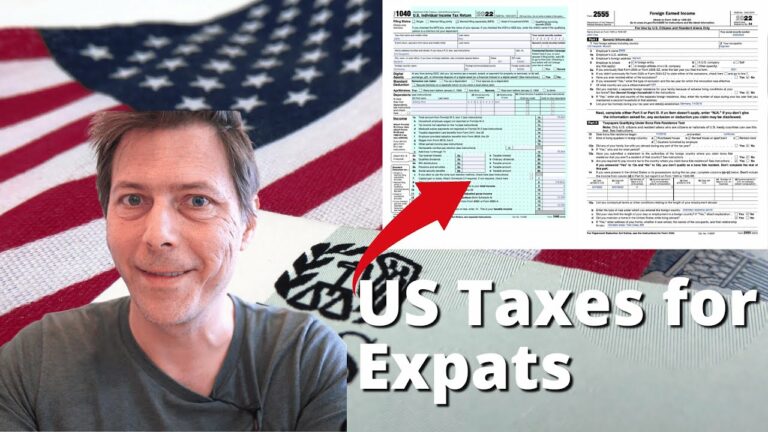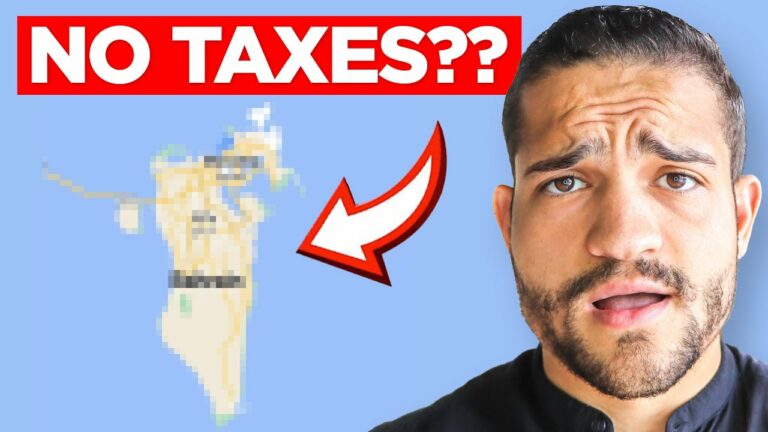Tax Relief: Golden Visas & Opportunities for Foreigners
Are you an expat living in a foreign country? Have you been struggling to navigate the complex and often confusing world of taxes in your new home? As a seasoned expat myself, I know firsthand the challenges that come with managing and understanding taxes abroad.
I recall my own experience when I first moved to Portugal, I was completely overwhelmed by the complex tax system and the language barrier made it even more difficult to comprehend. However, after doing some research, I discovered that there are tax relief programs available for foreigners living abroad. These programs not only provide financial relief, but they also ease the burden of navigating an unfamiliar tax system.
The truth is, taxes for expats can be daunting, but luckily, there are ways to minimize the stress and maximize the benefits. From special deductions to exclusions, there are a variety of tax relief options available to foreign residents. And believe me, taking advantage of these programs can make a huge difference in your overall financial situation.
So, if you’re an expat living abroad and feeling overwhelmed by taxes, don’t despair! With some research and guidance, you can navigate the system and take advantage of tax relief programs available for foreigners. In this article, I’ll provide you with all the information you need to take advantage of these programs and ease your financial burden while living abroad.
Can foreigners pay taxes in the US?
As a foreigner living in the United States, one of the questions you may ask is whether you are required to pay taxes. The short answer is yes, but it depends on your situation. In this article, we’ll provide an overview of tax requirements for foreigners in the US and how to obtain tax relief.
Who needs to pay taxes in the US?
If you earn income in the US, regardless of your citizenship or residency status, you may be required to pay taxes. The US tax system is based on the principle of taxing income regardless of where it is earned. This means that if you work for a US company or have US-based clients, you will need to file a tax return.
Even if you don’t receive income from a US source, you may still be required to file a tax return if you meet certain criteria. For example, if you have a green card and are a lawful permanent resident of the US, you are considered a tax resident and must file a tax return.
What taxes do foreigners in the US need to pay?
If you are required to file a tax return, you will need to pay federal income tax on your earnings. The tax rate varies depending on your income level and filing status. In addition to federal income tax, you may also need to pay state and local taxes, depending on where you live.
If you are self-employed or have income from rental properties, investments, or other sources, you may also be subject to self-employment tax, which goes toward Social Security and Medicare.
How to obtain tax relief as a foreigner in the US
As a foreigner, navigating the US tax system can be challenging and overwhelming. Fortunately, there are options for obtaining tax relief and reducing your tax burden.
One option is to take advantage of tax treaties between the US and your home country. These treaties are designed to prevent double taxation, which occurs when you pay taxes on the same income in both the US and your home country. Many tax treaties also offer exemptions and reduced tax rates for certain types of income.
Another option is to claim foreign tax credits on your US tax return. If you pay taxes on your income in your home country, you can use those taxes as a credit against your US tax liability. This can help reduce your overall tax bill.
If you are struggling to understand your tax obligations or need help filing your tax return, consider working with a tax professional who specializes in working with foreigners living in the US. They can help you navigate the complex tax system and ensure that you are taking advantage of all available tax relief options.
In conclusion
While the US tax system can be complex and intimidating, it is important to understand your tax obligations as a foreigner living in the US. By knowing what taxes you need to pay and how to obtain tax relief, you can ensure that you are in compliance with US tax laws and maximize your financial well-being.
Who qualifies for the foreign earned income exclusion?
If you are a U.S. citizen or resident alien, living and working abroad, you may be eligible for the foreign earned income exclusion. This tax relief allows you to exclude a certain amount of your foreign earned income from U.S. taxation.
What is foreign earned income?
Foreign earned income is any income you receive for services rendered while living and working abroad. This can include wages, salaries, and self-employment income. It does not include income from investments or rental properties.
How do I qualify?
There are two tests you must meet to qualify for the foreign earned income exclusion:
- Physical presence test: You must be physically present in a foreign country for at least 330 full days during a 12-month period. The 12-month period can start on any day of the year and does not have to coincide with the calendar year.
- Bona fide residence test: If you are a U.S. citizen or resident alien, you must be a bona fide resident of a foreign country for an uninterrupted period that includes an entire tax year. This means you must have established a permanent residence in a foreign country and have no intention of returning to the U.S. in the near future.
What is the maximum exclusion amount?
For tax year 2021, the maximum exclusion amount is $108,700. This means you can exclude up to $108,700 of your foreign earned income from U.S. taxation. If you are married and both you and your spouse meet the qualifications, each of you can exclude up to $108,700, effectively doubling the exclusion amount.
What if I don’t meet the requirements for the foreign earned income exclusion?
If you do not meet the requirements for the foreign earned income exclusion, you may still be able to claim the foreign tax credit. This credit allows you to offset the taxes you paid on your foreign income with your U.S. tax liability. You cannot claim both the foreign earned income exclusion and the foreign tax credit for the same income.
Living and working abroad can be an exciting adventure, but understanding the tax implications can be overwhelming. It’s important to work with a tax professional who can guide you through the process and ensure you are taking advantage of all the tax benefits available to you.
What is the maximum foreign income exclusion for 2023?
As a foreigner living and working abroad, taxes can be a tricky subject to navigate. However, there are some tax relief options available, including the foreign income exclusion. This exclusion allows you to exclude a certain amount of your foreign income from U.S. taxation.
For the year 2023, the maximum foreign income exclusion is $108,700. This means that if you earn less than $108,700 in foreign income, you may be able to exclude all of it from U.S. taxation. If you earn more than this amount, you may still be able to exclude a portion of it.
It’s important to note that the foreign income exclusion only applies to earned income, meaning income from employment or self-employment. It does not apply to investment income or other types of income. Additionally, in order to qualify for the foreign income exclusion, you must meet certain requirements, such as being a U.S. citizen or resident alien and having a tax home in a foreign country.
When it comes to taxes, it’s always best to consult with a tax professional who has experience working with expats. They can help you navigate the complex tax laws and ensure that you’re taking advantage of all available tax relief options.
Living and working abroad can be both exciting and challenging, and navigating taxes is just one of the many tasks that come with the territory. However, with a bit of research and the right guidance, you can make the most of your expat experience and enjoy the adventures that come with living abroad.
How does a foreigner file a US tax return?
Moving abroad can be an exciting and life-changing experience, but it also comes with its fair share of challenges, including the need to file taxes in your home country and potentially in your new country of residence. If you’re a foreigner living in the United States, you may be wondering how to properly file your US tax return. In this article, we’ll cover the basics of US tax filing for foreigners, including eligibility for tax relief.
Who needs to file a US tax return?
Before we dive into the specifics of how to file a US tax return as a foreigner, let’s first determine whether you actually need to file. Generally, if you are a nonresident alien who earns income in the United States, you are required to file a tax return if your income from US sources exceeds a certain threshold. For the 2020 tax year, this threshold is $12,400.
How to file a US tax return as a foreigner
If you do need to file a US tax return as a foreigner, the process may seem daunting at first. However, there are resources available to help you navigate the process. Here are the basic steps to follow:
1. Gather your documents: You will need to gather any tax-related documents you received during the year, such as W-2 or 1099 forms.
2. Determine your tax status: As a foreigner, your tax status will likely be either a nonresident alien or a resident alien. Your tax status will impact which tax forms you need to fill out and what tax exemptions you may be eligible for.
3. Fill out the appropriate tax forms: Depending on your tax status and the types of income you earned, you will need to fill out one or more tax forms. The most common form for nonresident aliens is Form 1040NR.
4. File your tax return: Once you have filled out the appropriate tax forms, you can file your tax return either by mail or online.
Tax relief for foreigners
If you are a foreigner living in the United States, you may be eligible for certain tax relief programs. One such program is the Foreign Earned Income Exclusion, which allows qualifying individuals to exclude up to $107,600 of their foreign earned income from US taxation. Additionally, there are tax treaties between the United States and many other countries that may provide relief or exemptions for certain types of income.
Final thoughts
Filing taxes as a foreigner living in the United States can be overwhelming, but it’s important to do so to avoid potential penalties or legal issues. By following the steps outlined in this article and seeking the advice of a qualified tax professional, you can ensure that you are properly filing your US tax return and taking advantage of any available tax relief programs. Remember, with a little bit of preparation and research, you can successfully navigate the complex world of US taxation as a foreigner.
tax relief for foreigners is a vital aspect of expat life, and understanding the legal aspects of tax relief is crucial. From citizenship programs and golden visas to local customs and cultural events, there is a lot to take into consideration when moving to a new country. I highly recommend researching the tax laws and regulations of the country you plan to move to, and seeking professional advice if necessary. By taking advantage of tax relief programs, you can save money and make the most of your expat experience. Remember, being informed and proactive is the key to success when living abroad.


